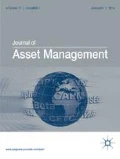Abstract
This article empirically compares different rating approaches of corporate social performance (CSP) using environmental, social and corporate governance (ESG) scores of three important sustainability rating providers. We both comment on the ESG level and the risk of changes in a company’s ESG level. These ratings are highly relevant to managers and investors comprising ESG issues into their decision-making process. Furthermore, a number of empirical studies, focused on corporate social responsibility topics, are based on certain ESG scoring approaches. The data set includes ESG data for more than 8500 companies worldwide. The article suggests an evident lack in the convergence of ESG measurement concepts. The different ratings neither coincide in distribution nor in risk. Therefore, all CSP stakeholders are encouraged to critically evaluate the validity of the particular ESG scoring model.


Similar content being viewed by others
References
Bauer, R., Koedijk, K. and Roger, O. (2005) International evidence on ethical mutual fund performance and investment style. Journal of Banking & Finance 29 (7): 1751–1767.
Bawa, V.S. (1975) Optimal rules for ordering uncertain prospects. Journal of Financial Economics 2 (1): 95–121.
Bello, Z.Y. (2005) Socially responsible investing and portfolio diversification. Journal of Financial Research 28 (1): 41–57.
Bird, R., Momenté, F. and Reggiani, F. (2012) The market acceptance of corporate social responsibility: A comparison across six countries regions. Australian Journal of Management 37 (2): 153–168.
Bouslah, K., Kryzanowski, L. and M’Zali, B. (2013) The impact of the dimensions of social performance on firm risk. Journal of Banking & Finance 37 (4): 1258–1273.
Cai, Y., Jo, H. and Pan, C. (2012) Doing well while doing bad? CSR in controversial industry sectors. Journal of Business Ethics 108 (4): 467–480.
Chatterji, A., Durand, R., Levine, D. and Touboul, S. (2015) Do ratings of firms converge? Implications for strategy research. Strategic Management Journal. advance online publication August 11, doi:10.1002/smj.2407.
Chatterji, A., Levine, D. and Toffel, M. (2009) How well do social ratings actually measure corporate social responsibility? Journal of Economics and Management Strategy 18 (1): 125–169.
Chatterji, A. and Toffel, M. (2010) How firms respond to being rated. Strategic Management Journal 31 (9): 917–945.
Chava, S. (2014) Environmental externalities and cost of capital. Management Science 60 (9): 2223–2247.
Cheng, B., Ioannou, I. and Serafeim, G. (2014) Corporate social responsibility and access to finance. Strategic Management Journal 35 (1): 1–23.
Crilly, D., Zollo, M. and Hansen, M. (2012) Faking it or muddling through? Understanding decoupling in response to stakeholder pressures. Academy of Management Journal 55 (6): 1429–1448.
Dorfleitner, G., Leidl, M. and Reeder, J. (2012) Theory of social returns in portfolio choice with application to microfinance. Journal of Asset Management 13 (6): 348–400.
Dorfleitner, G. and Utz, S. (2012) Safety first portfolio choice based on financial and sustainability returns. European Journal of Operational Research 221 (1): 155–164.
Eccles, R.G., Ioannou, I. and Serafeim, G. (2014) The impact of corporate sustainability on organizational processes and performance. Management Science 60 (11): 2835–2857.
Fernando, C.S., Sharfman, M.P. and Uysal, V.B. (2009) Does Greenness Matter? Environmental Performance, Ownership Structure and Analyst Coverage. Norman: University of Oklahoma, Working Paper.
Fishburn, P.C. (1977) Mean-risk analysis with risk associated with below-target returns. The American Economic Review 67 (2): 116–126.
Galema, R., Plantinga, A. and Scholtens, B. (2008) The stocks at stake: Return and risk in socially responsible investment. Journal of Banking & Finance 32 (12): 2646–2654.
Ghoul, S.E., Guedhami, O., Kwok, C.C.Y. and Mishra, D.R. (2011) Does corporate social responsibility affect the cost of capital? Journal of Banking & Finance 35 (9): 2388–2406.
Goss, A. and Roberts, G.S. (2011) The impact of corporate social responsibility on the cost of bank loans. Journal of Banking & Finance 35 (7): 1794–1810.
Halbritter, G. and Dorfleitner, G. (2015) The wages of social responsibility – Where are they? A critical review of ESG investing. Review of Financial Economics 26 (3): 25–35.
Humphrey, J.E., Lee, D.D. and Shen, Y. (2011) The independent effects of environmental, social and governance initiatives on the performance of UK firms. Australian Journal of Managment 37 (2): 135–151.
Ioannou, I. and Serafeim, G. (2012) What drives corporate social performance? The role of nation-level institutions. Journal of International Business Studies 43 (9): 834–864.
Jean, W.H. (1975) Comparison of moment and stochastic dominance ranking methods. Journal of Financial and Quantitative Analysis 10 (1): 151–161.
Jessen, P. (2012) Optimal responsible investment. Applied Financial Economics 22 (21): 1827–1840.
Johnson, R. and Greening, D. (1999) The effects of corporate governance and institutional ownership types on corporate social performance. Academy of Management Journal 42 (5): 564–576.
Kempf, A. and Osthoff, P. (2007) The effect of socially responsible investing on portfolio performance. European Financial Management 13 (5): 908–922.
Kreander, N., Gray, G., Power, D.M. and Sinclair, C.D. (2005) Evaluating the performance of ethical and non-ethical funds: A matched pair analysis. Journal of Business Finance & Accounting 32 (7–8): 1465–1493.
Luo, X. and Bhattacharya, C.B. (2009) The debate over doing good: Corporate social performance, strategic marketing levers, and firm-idiosyncratic risk. Journal of Marketing 73 (6): 198–213.
Mănescu, C. (2011) Stock returns in relation to environmental, social and governance performance: Mispricing or compensation for risk? Sustainable Development 19 (2): 95–118.
McWilliams, A. and Siegel, D. (2001) Corporate social responsibility: A theory of the firm perspective. Academy of Management Review 26 (1): 117–127.
Oikonomou, I., Brooks, C. and Pavelin, S. (2012) The impact of corporate social performance on financial risk and utility: A longitudinal analysis. Financial Management 41 (2): 483–515.
Renneboog, L., Horst, J.T. and Zhang, C. (2008) Socially responsible investments: Institutional aspects, performance, and investor behavior. Journal of Banking & Finance 32 (9): 1723–1742.
Ruf, B., Muralidhar, K., Brown, R., Janney, J. and Paul, K. (2001) An empirical investigation of the relationship between change in corporate social performance and financial performance: A stakeholder theory perspective. Journal of Business Ethics 32 (2): 143–156.
Schröder, M. (2007) Is there a difference? The performance characteristics of SRI equity indices. Journal of Business Finance & Accounting 34 (1): 331–348.
Semenova, N. and Hassel, L.G. (2014) On the validity of environmental performance metrics. Journal of Business Ethics. advance online publication August 17, doi:10.1007/s10551-014-2323-4.
Statman, M. (2006) Socially responsible indexes: Composition, performance, and tracking error. The Journal of Portfolio Management 32 (3): 100–109.
Statman, M. and Glushkov, D. (2009) The wages of social responsibility. Financial Analysts Journal 65 (4): 33–46.
US SIF (2014) Report on US Sustainable, Responsible and Impact Investing Trends 2014. Forum for Sustainable and Responsible Investment, US SIF Foundation, http://www.ussif.org.
Utz, S., Wimmer, M., Hirschberger, M. and Steuer, R.E. (2014) Tri-criterion inverse portfolio optimization with application to socially responsible mutual funds. European Journal of Operational Research 234 (2): 491–498.
Waddock, S.A. and Graves, S.B. (1997) The corporate social performance-financial performance link. Strategic Management Journal 18 (4): 303–319.
Wimmer, M. (2013) ESG-persistence in socially responsible mutual funds. Journal of Management and Sustainability 3 (1): 9–15.
Acknowledgements
We thank the Fritz Thyssen Stiftung, which provided financial support for the project ‘Spezielle Aspekte der Berücksichtigung von Nachhaltigkeit in der Anlageentscheidung’.
Author information
Authors and Affiliations
Additional information
2currently works as a Management Consultant at zeb.rolfes.schierenbeck.associates GmbH with focus on the financial services industry. In 2015 he completed his PhD at the University of Regensburg. He also holds master’s degrees in Business Administration and Economics. His research interests include asset pricing and socially responsible investments.
Rights and permissions
About this article
Cite this article
Dorfleitner, G., Halbritter, G. & Nguyen, M. Measuring the level and risk of corporate responsibility – An empirical comparison of different ESG rating approaches. J Asset Manag 16, 450–466 (2015). https://doi.org/10.1057/jam.2015.31
Received:
Revised:
Published:
Issue Date:
DOI: https://doi.org/10.1057/jam.2015.31




